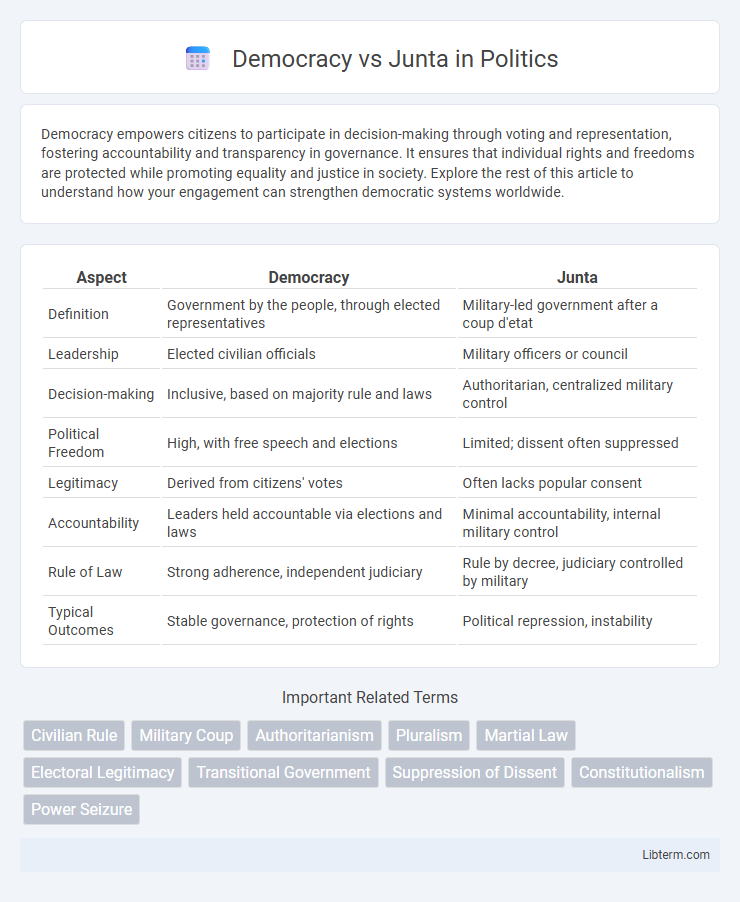Democracy empowers citizens to participate in decision-making through voting and representation, fostering accountability and transparency in governance. It ensures that individual rights and freedoms are protected while promoting equality and justice in society. Explore the rest of this article to understand how your engagement can strengthen democratic systems worldwide.
Table of Comparison
| Aspect | Democracy | Junta |
|---|---|---|
| Definition | Government by the people, through elected representatives | Military-led government after a coup d'etat |
| Leadership | Elected civilian officials | Military officers or council |
| Decision-making | Inclusive, based on majority rule and laws | Authoritarian, centralized military control |
| Political Freedom | High, with free speech and elections | Limited; dissent often suppressed |
| Legitimacy | Derived from citizens' votes | Often lacks popular consent |
| Accountability | Leaders held accountable via elections and laws | Minimal accountability, internal military control |
| Rule of Law | Strong adherence, independent judiciary | Rule by decree, judiciary controlled by military |
| Typical Outcomes | Stable governance, protection of rights | Political repression, instability |
Introduction: Understanding Democracy vs Junta
Democracy represents a political system where power is vested in the people through free and fair elections, ensuring accountability, human rights, and the rule of law. In contrast, a junta is an authoritarian regime led by a military or political group that seizes control, often suspending civil liberties and suppressing political opposition. Understanding the fundamental differences between democracy and junta highlights the varying impacts on governance, citizen participation, and institutional stability.
Historical Background of Democracies and Juntas
Democracies trace their roots to ancient Athens, where direct citizen participation laid the foundation for modern representative governments emphasizing individual rights and electoral processes. Juntas, often emerging from military coups, have historically been seen in Latin American and African countries during the 20th century, where armed forces seized control to maintain order or suppress dissent. The contrasting origins reveal democracies as institutions built on popular sovereignty, whereas juntas derive legitimacy through coercive power and centralized authority.
Key Features of Democratic Governments
Democratic governments emphasize free and fair elections, ensuring citizens have the power to choose their representatives through universal suffrage. Key features include the protection of individual rights and freedoms, separation of powers among branches of government, and the rule of law that holds leaders accountable. Transparency, political pluralism, and active civic participation are fundamental to democratic systems, contrasting sharply with the centralized, authoritarian control characteristic of juntas.
Defining Characteristics of Military Juntas
Military juntas typically seize power through a coup d'etat, suspending democratic institutions and ruling by decree without electoral legitimacy. Characterized by centralized authority under military leaders, these regimes prioritize security and order over political freedoms, often suppressing dissent and controlling media. Unlike democracies, military juntas lack transparent governance, separation of powers, and protection of civil liberties, resulting in authoritarian control maintained through coercion and hierarchical command structures.
Governance Mechanisms: Democracy vs Junta
Democracy employs governance mechanisms based on representative institutions, regular free elections, and the rule of law that ensures accountability and citizen participation. In contrast, a junta centralizes power in a military or authoritarian group, enforcing decisions through coercion and limiting political freedoms. Democratic governance mechanisms promote transparency and checks and balances, while juntas often suppress opposition and operate through unilateral control.
Political Participation and Citizen Rights
Democracy ensures broad political participation through free elections and active citizen engagement in decision-making processes, safeguarding fundamental rights such as freedom of speech, assembly, and press. In contrast, a junta centralizes power within a military or authoritarian group, severely restricting political participation and curtailing civil liberties to maintain control. The suppression of dissent and limited citizen influence in a junta starkly contrasts with the inclusive, rights-based framework of democratic governance.
Economic Impacts: Comparing the Two Systems
Democracies generally promote economic growth by fostering political stability, protecting property rights, and encouraging foreign investment through transparent institutions. In contrast, juntas often lead to economic instability due to unpredictable policy shifts, lack of accountability, and potential sanctions from the international community. Empirical studies show that countries under democratic governance typically experience higher GDP growth rates and better income distribution compared to those ruled by military juntas.
Human Rights and Freedom under Both Regimes
Democracy upholds human rights and freedoms through constitutional protections, free elections, and an independent judiciary, ensuring citizens' voices are heard and civil liberties respected. Junta regimes often suppress dissent, restrict freedom of expression, and violate human rights to maintain control, with limited or no accountability mechanisms. The contrast between the two lies in the institutional support for participation and rights under democracy versus repression and centralized power under a junta.
Stability, Security, and Corruption
Democracy typically ensures greater political stability through institutional checks and citizen participation, reducing the risk of abrupt power shifts seen in juntas. Security under democratic regimes is often sustained by rule of law and accountable law enforcement, contrasting with juntas where military control can lead to arbitrary use of force. Corruption tends to be lower in democracies due to transparency mechanisms and press freedom, whereas juntas frequently exhibit higher corruption levels due to centralized, unchecked power.
Future Prospects: Transition from Junta to Democracy
Future prospects for transitioning from junta to democracy depend heavily on strengthening civil institutions, promoting inclusive governance, and ensuring transparent elections. International support and internal reforms create pressure for military regimes to cede power while fostering stable democratic frameworks. Successful transitions often require reconciliation processes, legal reforms, and fostering political pluralism to sustain long-term democratic resilience.
Democracy Infographic

 libterm.com
libterm.com